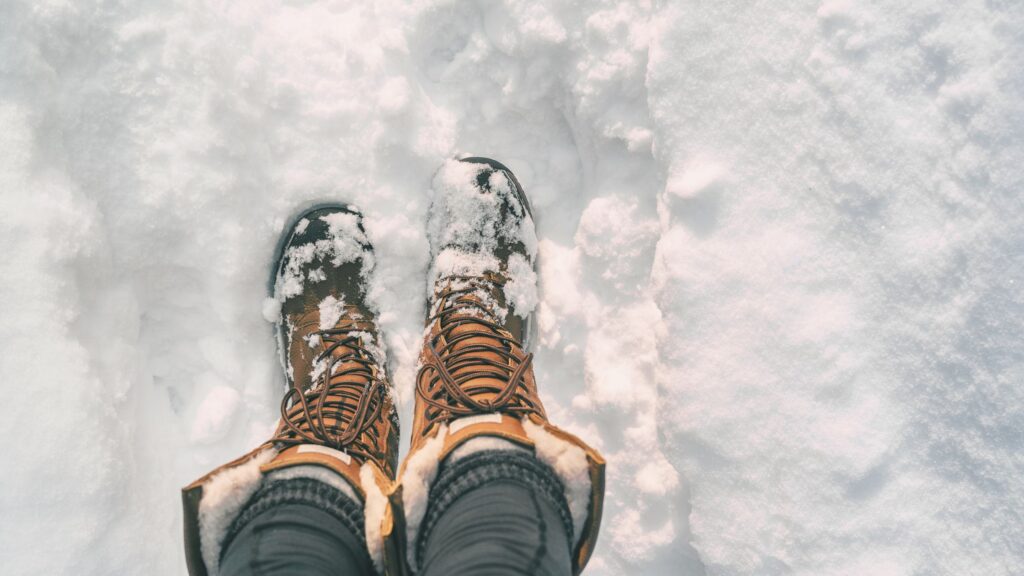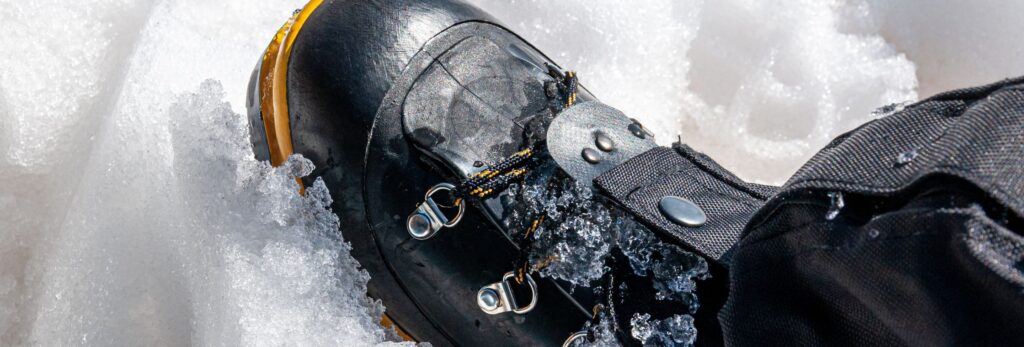Can Waterproof Hiking Boots Be Used In Snow?
Introduction
When embarking on an outdoor adventure, especially in snowy conditions, choosing the right footwear is essential. Many hikers ask, “Can waterproof hiking boots be used in snow?” This comprehensive guide explores whether waterproof hiking boots are suitable for snow, detailing their features, benefits, and limitations.
Table of Contents
What This Post Covers
In this post, readers will learn:
- An overview of waterproof hiking boots and their typical uses.
- Key features that make waterproof hiking boots suitable or unsuitable for snow.
- The benefits and drawbacks of using waterproof hiking boots in snowy conditions.
- Factors to consider when choosing boots for snow hiking.
- Practical tips for maximizing comfort and safety when using waterproof hiking boots in snow.
What Are Waterproof Hiking Boots?
Waterproof hiking boots are designed to keep your feet dry in wet conditions. They are made with materials such as Gore-Tex or other waterproof membranes that prevent water from entering the boot while allowing moisture inside to escape. These boots are built for rugged terrain, offering durability, support, and protection from the elements. But can waterproof hiking boots be used in snow? Let’s find out.

What Do Waterproof Hiking Boots Involve?
Key Features
- Waterproof Membrane: A layer that prevents water from penetrating while allowing moisture inside the boot to escape.
- Insulation: Some waterproof hiking boots include insulation to keep feet warm in cold conditions.
- Durable Construction: Made from high-quality materials to withstand harsh environments.
- Enhanced Traction: Soles designed for superior grip on slippery surfaces.
- Support and Comfort: Padded interiors and supportive midsoles for long hikes.
Different Types
- Lightweight Boots: Suitable for less demanding hikes and warmer conditions.
- Midweight Boots: Offer a balance of support and flexibility for a variety of terrains.
- Heavyweight Boots: Built for challenging hikes and extreme conditions, often with added insulation.
Can Waterproof Hiking Boots Be Used In Snow?
Benefits of Using Waterproof Hiking Boots in Snow
Can waterproof hiking boots be used in snow? Absolutely. Here are the benefits:
- Waterproofing: Keeps feet dry in snowy and slushy conditions, preventing discomfort and cold-related issues.
- Insulation: Many waterproof hiking boots come with insulation, providing warmth in cold temperatures.
- Traction: Designed with soles that offer good grip on snow and ice, reducing the risk of slipping.
- Versatility: Suitable for a variety of terrains and conditions, making them a versatile choice for winter hiking.
Drawbacks of Using Waterproof Hiking Boots in Snow
While waterproof hiking boots offer many benefits, there are some drawbacks to consider when asking, “Can waterproof hiking boots be used in snow?”:
- Limited Insulation: Not all waterproof hiking boots have adequate insulation for extremely cold conditions.
- Stiffness: Some boots may be too rigid, affecting comfort and mobility.
- Weight: Heavier boots can cause fatigue over long distances, particularly in deep snow.
- Breathability: Waterproof membranes can reduce breathability, leading to sweaty feet in milder conditions.
Factors of How Can Waterproof Hiking Boots Be Used In Snow?
When Can Waterproof Hiking Boots Be Used in Snow?
Can waterproof hiking boots be used in snow? Yes, in specific scenarios:
- Light to Moderate Snow: Boots with waterproof membranes and some insulation can handle light to moderate snow, keeping feet dry and warm.
- Day Hikes: Suitable for short to medium-length hikes where you expect to encounter snow but not extreme cold or deep snow.
- Mixed Conditions: Ideal for trails with varying conditions, including wet, snowy, and muddy sections.
Considerations Before Using Waterproof Hiking Boots in Snow
Can waterproof hiking boots be used in snow? Consider these factors:
- Insulation Needs: Evaluate the insulation level of the boots based on the expected temperatures. For very cold conditions, ensure the boots have sufficient insulation.
- Traction Requirements: Check the sole design for adequate grip on ice and packed snow.
- Boot Fit: Ensure a good fit to accommodate thicker socks or foot swelling in cold conditions.
- Duration and Intensity: Consider the length and difficulty of your hike. For long or strenuous hikes, choose boots that balance warmth, support, and weight.
Tips for Using Waterproof Hiking Boots in Snow
To answer “Can waterproof hiking boots be used in snow?” effectively, follow these tips:
- Layer with Warm Socks: Wear moisture-wicking, thermal socks to enhance warmth and comfort.
- Use Gaiters: Gaiters can prevent snow from entering the boots, keeping feet dry.
- Apply Waterproof Treatments: Regularly treat your boots with waterproofing products to maintain their water resistance.
- Break Them In: Ensure your boots are well broken in before undertaking long hikes to avoid blisters and discomfort.
Why Are Waterproof Hiking Boots Different from Regular Winter Boots?
Can waterproof hiking boots be used in snow? Understanding the differences is crucial.
Specialized Construction
Waterproof hiking boots are specifically designed for rugged outdoor activities, with features like enhanced traction, durable materials, and support structures. While regular winter boots focus primarily on warmth and protection from the cold, hiking boots also prioritize performance on varied terrains.
Versatility and Performance
Waterproof hiking boots are versatile, capable of handling a range of conditions from wet and muddy trails to snowy paths. They provide better support and traction compared to regular winter boots, which may not be suitable for hiking on uneven or challenging terrain.
Things to Look for When Using Waterproof Hiking Boots in Snow
Insulation
Can waterproof hiking boots be used in snow? Yes, with proper insulation. Choose boots with appropriate insulation for the expected temperatures. Thinsulate, PrimaLoft, and other synthetic insulations are commonly used to provide warmth without excessive bulk.
Traction
Opt for boots with aggressive lug patterns and rubber compounds designed for cold weather. Some boots are compatible with traction devices like microspikes or crampons for added security on ice.
Fit and Comfort
Ensure a proper fit to accommodate layering with thicker socks. Look for boots with a snug heel and ample toe room to prevent blisters and maintain circulation in cold conditions.
Durability
Select boots made from high-quality materials that can withstand the rigors of winter hiking, including abrasion from ice and rocks, as well as exposure to moisture and cold.

Conclusion
So, can waterproof hiking boots be used in snow? The answer is yes, with some caveats. Waterproof hiking boots can be an excellent choice for snowy conditions, particularly for light to moderate snow and mixed terrain. They offer the benefits of waterproofing, insulation, and traction, making them versatile and reliable for winter hikes. However, for extreme cold or deep snow, you may need boots with higher insulation and specialized features.
By considering factors such as insulation, traction, fit, and durability, you can select the right waterproof hiking boots for your snowy adventures and enjoy the trails with comfort and safety.
Frequently Asked Questions:
1. Can Waterproof Hiking Boots Be Used in Deep Snow?
Can waterproof hiking boots be used in snow? Yes, but for deep snow, ensure they have adequate insulation and pair them with gaiters to prevent snow from entering the boots. For very deep snow, consider specialized winter hiking boots.
2. Are Waterproof Hiking Boots Warm Enough for Winter?
Can waterproof hiking boots be used in snow? Many waterproof hiking boots are warm enough for winter, especially those with added insulation. However, for extremely cold conditions, look for boots specifically designed for winter use with higher insulation ratings.
3. How Do I Maintain Waterproof Hiking Boots for Snow Use?
Can waterproof hiking boots be used in snow? Maintain your waterproof hiking boots by cleaning them after each use, applying waterproof treatments regularly, and drying them thoroughly. Store them in a cool, dry place to prevent mold and material degradation.
4. Can I Use Waterproof Hiking Boots with Traction Devices?
Can waterproof hiking boots be used in snow? Yes, many waterproof hiking boots are compatible with traction devices like microspikes or crampons, which can enhance grip on icy and snowy surfaces.
5. Do Waterproof Hiking Boots Provide Good Traction on Ice?
Can waterproof hiking boots be used in snow? Waterproof hiking boots designed for winter use often have soles with aggressive lug patterns and rubber compounds that provide good traction on ice. For added safety, consider using traction devices.

My name is Oje and I’m obsessed with finding the latest tech gear to help people track progress and solve problems more efficiently. I spend countless hours researching and testing innovative apps, wearables, and devices for fitness, health, productivity, and more.
